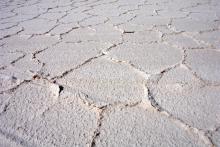National Aeronautics and Space Administration
July was 'hottest on record'
Last month was the hottest July since 1880, according to Greek official records, with NASA data indicating that, on a global level, July was one of the hottest months on record.
With two back-to-back heat waves last month, temperatures reached nearly 46 degrees Celsius (114.8 Fahrenheit) on Crete.
- Read more about July was 'hottest on record'
- Log in to post comments
Asteroid to pass by Earth on September 1 (video)
A massive asteroid estimated to be 2.7 miles wide is set to make a ‘relatively close encounter’ with Earth on September 1.
Dubbed ‘Florence,’ the huge space rock will pass just 4.4 million miles from our planet – or, about 18 times the distance between Earth and the moon.
- Read more about Asteroid to pass by Earth on September 1 (video)
- Log in to post comments
Russian-Greek cosmonaut Yurchikhin Grammatikopoulos to make 6h space walk
Russian cosmonaut of Greek descent Fyodor Nikolayevich Yurchikhin Grammatikopoulos will make a six-hour walk outside the ISS space station where he has been since April.
NASA TV will broadcast live the cosmonaut’s trip. The broadcast is schedule to start at 17:00 (Athens time) on Thursday 17 August.
Space X Sends a Supercomputer into Orbit
The company of billionaire Elon Musk SpaceX will send a cargo ship without crew to the International Space Station (ISS). A supercomputer will be brought into the orbit to help astronauts on missions in the open space. Reports iNews.
- Read more about Space X Sends a Supercomputer into Orbit
- Log in to post comments
2017 is so Far the 2nd-Hottest Year on Record Thanks to Global Warming
With the first six months of 2017 in the books, average global surface temperatures so far this year are 0.94°C above the 1950-1980 average, according to NASA. That makes 2017 the second-hottest first six calendar months on record, behind only 2016, The Guardian reported.
NASA is Planning to Send the Best of Social Networks into Space
NASA intends to send a space capsule to space with a compilation of the best posts on social networks. This will be on one of the Voyager missions, which will celebrate 40 years of successful space travel in September.
Last ever Total Solar Eclipse will take place in 600 Million years as the Moon recedes from Earth
The total solar eclipse on 21 August will be the first to pass across the whole of the U.S., from the Pacific to the Atlantic, in 99 years.
Total solar eclipses are a rarer occurrence than solar eclipses, which take place on average once every 18 months.
NASA has a job opening for someone to defend Earth from aliens — and it pays a six-figure salary!
US government scientists work hard to protect the public.
Some study infectious diseases and effective treatments. Others ensure that drugs, food, vehicles, or consumer products live up to their claims and don’t harm anyone.
People are calling this NASA statement a “Warning” – Read it for yourself
People have been calling NASA’s latest statement about the upcoming total solar eclipse a “warning,” but the agency simply refers to the suggestions as “safety tips.” Either way, you’ll want to check it out. The list of best practices applies to the celestial phenomenon that’s set to occur on August 21, when an estimated 300 million people may be able to view a total solar eclipse.
How these astronauts had life-changing experiences with Aliens (VIDEO)
How often have we thought about the existence of life beyond Earth, and feared that if we ever encountered extraterrestrial beings, they might wreak all kinds of havoc on our planet, as shown in the movies.










